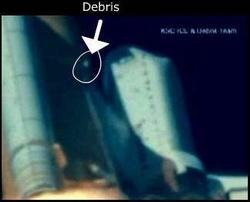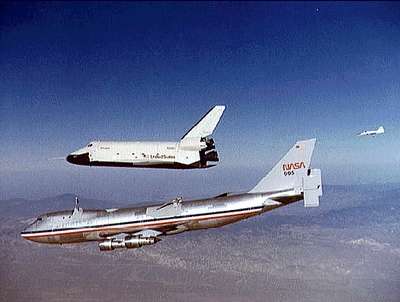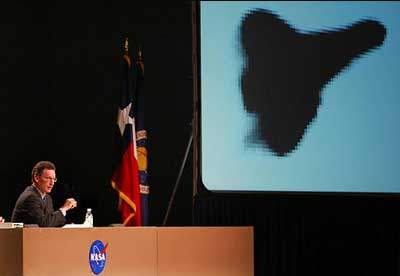Sun, Jun 01, 2003
Air Force: Initial Findings "Significant"
 "We're not drawing any conclusions," said Air
Force Lt. Col. Woody Woodyard, a spokesman for the Columbia
Accident Investigation Board, Friday. "We've got to analyze the
data and evaluate all the data before we can draw any conclusions."
But, he described the results of impact testing on a simulated
shuttle wing Thursday as "significant."
"We're not drawing any conclusions," said Air
Force Lt. Col. Woody Woodyard, a spokesman for the Columbia
Accident Investigation Board, Friday. "We've got to analyze the
data and evaluate all the data before we can draw any conclusions."
But, he described the results of impact testing on a simulated
shuttle wing Thursday as "significant."
The test, which has been months in the making and involves rare,
if not impossible-to-find, shuttle materials, show significant
damage to the leading edge of one of the space plane's wings after
it was hit by insulating foam - the kind of foam that struck the
left wing of the shuttle Columbia 82 seconds after lift-off Jan.
16.
A Difficult, But Revealing Simulation
At the Southwest Research Institute in San Antonio (TX),
Thursday, scientists fired a 1.67 pound chunk of real insulating
foam - the type used to control the temperature aboard the
shuttle's huge external fuel tank - at the fiberglass leading edge
of a space plane wing. The foam was launched at the approximate
speed it would have tumbled from the fuel tank into th leading edge
of Columbia's left wing - 553 mph. Lt. Col. Woodyard (USAF) said
the foam struck the wing's sixth panel, opening a 22-inch gash in
the leading edge. Almost since the day after Columbia disintegrated
upon re-entry Feb. 1, suspicions about the cause of the accident
have centered on the shuttle's left wing.

Finding something resembling the shuttle wing without
dismantling the only other three space planes still in service was
a major undertaking. Finally, scientists in San Antonio used a
piece of the prototype shuttle Enterprise's (above) wing for the
experiment. Since the fiberglass used in the Enterprise's wing is
2.5 times more resilient than the tile insulation aboard a flying
shuttle, the real-world damage to Columbia is thought to have been
much worse than in the simulation.

On the second day of Columbia's final flight, scientists had
noticed a piece of debris float away from the spacecraft. After
Thursday's simulation, they're almost certain now that it was part
of a left-wing seal found along the leading edge. It's departure
from the spacecraft would have left a horizontal slit along the
leading edge - the perfect place for superheated gases to force
their way inside the Colubmia's wing structure and lead to its
catastrophic delamination.
More News
“While legendary World War II aircraft such as the Corsair and P-51 Mustang still were widely flown at the start of the Korean War in 1950, a new age of jets rapidly came to >[...]
Decision Altitude (DA) A specified altitude (mean sea level (MSL)) on an instrument approach procedure (ILS, GLS, vertically guided RNAV) at which the pilot must decide whether to >[...]
Aero Linx: National Aviation Safety Foundation (NASF) The National Aviation Safety Foundation is a support group whose objective is to enhance aviation safety through educational p>[...]
Also: Cal Poly Aviation Club, $$un Country, Arkansas Aviation Academy, Teamsters Local 2118 In response to two recent general aviation accidents that made national headlines, more >[...]
“The FAA is tasked with ensuring our skies are safe, and they do a great job at it, but there is something about the system that is holding up the medical process. Obviously,>[...]
 Aero-News: Quote of the Day (04.28.25)
Aero-News: Quote of the Day (04.28.25) ANN's Daily Aero-Term (04.28.25): Decision Altitude (DA)
ANN's Daily Aero-Term (04.28.25): Decision Altitude (DA) ANN's Daily Aero-Linx (04.28.25)
ANN's Daily Aero-Linx (04.28.25) Airborne-Flight Training 04.24.25: GA Refocused, Seminole/Epic, WestJet v TFWP
Airborne-Flight Training 04.24.25: GA Refocused, Seminole/Epic, WestJet v TFWP Aero-News: Quote of the Day (04.29.25)
Aero-News: Quote of the Day (04.29.25)





